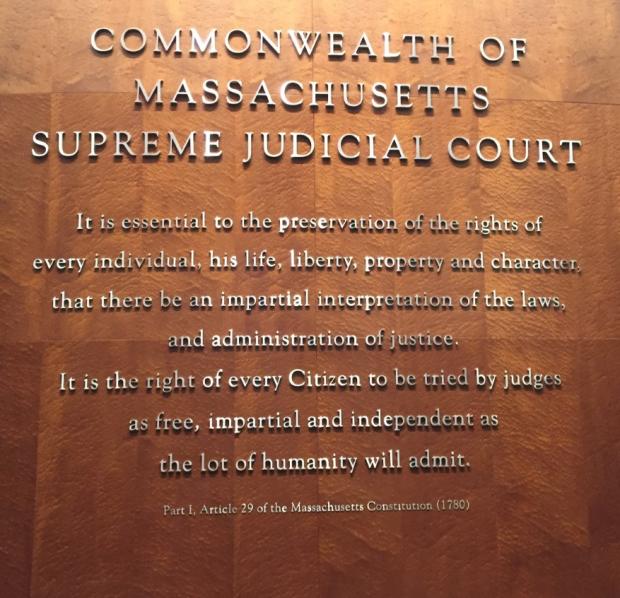- Trial Court Law Libraries

Article 29
It is essential to the preservation of the rights of every individual, his life, liberty, property, and character, that there be an impartial interpretation of the laws, and administration of justice. It is the right of every citizen to be tried by judges as free, impartial and independent as the lot of humanity will admit. It is, therefore, not only the best policy, but for the security of the rights of the people, and of every citizen, that the judges of the supreme judicial court should hold their offices as long as they behave themselves well; and that they should have honorable salaries ascertained and established by standing laws.
Precedents, Following Law, and Quotations
I George III, c. 23, Preamble (1760) from The Statutes at Large From the Thirty Second Year of King George II to the First year of King George III. Inclusive. by Danby Pickering (1766):
“[Y]our Majesty has been graciously pleased to declare from the throne to both houses of parliament, that you look upon the independency and uprightness of judges, as essential to the impartial administration of justice, as one of the best securities of the rights and liberties of your loving subjects, and as most conducive to the honour of your Crown; and in consequence thereof, your Majesty has recommended it to the consideration of your parliament, to make further provision for continuing judges in the enjoyment of their offices during their good behaviour, notwithstanding the demise of your Majesty, or any of your heirs and successors; and your Majesty has also desired your faithful commons, that you may be enabled to secure the salaries of judges, during the continuance of their commissions.”
Alexander H. Bullock, “The Centennial of the Massachusetts Constitution,” 1 Proceedings of the American Antiquarian Society 189 (1882), p. 193-194:
“There is no one feature of our governments which so clearly ensures the security of public and private rights as the setting the judicial power solemnly apart as a governing organ of the constitution, beyond the reach of the arm of the executive and legislature. And this was a stage of development which had not been made in a degree of perfection anywhere before the American Revolution. The men of Massachusetts saw the necessity of making this eminent consecration of the judiciary certain and enduring by a fundamental liberty recorded in written and unmistakable words.”
Margaret H. Marshall, “John Adams: Lawyer, Absentee Chief Justice, and Author of the Massachusetts Constitution”, 10 Massachusetts Legal History 27 (2004), p. 43, 45:
“Article XXIX, on the necessity of the impartial administration of justice, was based on Adam’s deeply held convictions, formed in part from his immense experience as a lawyer. . . Of all of John Adam’s numerous accomplishments, as attorney, legislator, judge, political philosopher, diplomat, first vice-president and second president of the United States, it is perhaps the ‘mighty invention’ of an independent judiciary in the Massachusetts Constitution adopted in 1780 that is his greatest legacy to humanity.”
Vestibule, Massachusetts Supreme Judicial Court Courtroom
John Adams Courthouse, Boston

